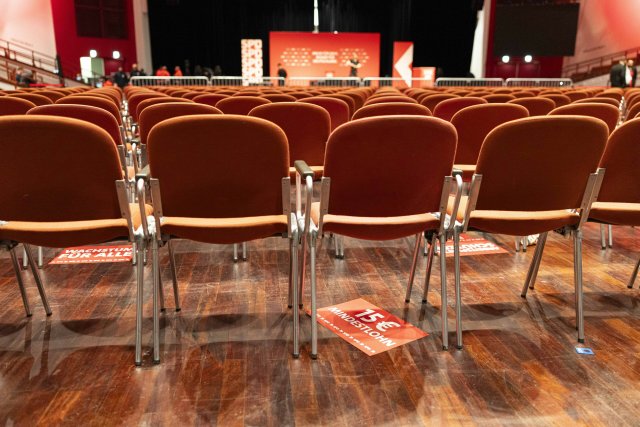- Kommentare
- »Neunzehnhundertachtzehn«
Robert Habeck wrote a play praising a right-wing mass murderer
Fifteen years ago, Germany’s Green vice chancellor wrote a play in which the hero is a right-wing mass murderer
Robert Habeck cuts a noble and tragic figure. The Green vice chancellor, with his three-day beard, open collar, and permanently disheveled look, strikes many as a former idealist who has been forced to abandon his principles. Deborah Feldman, an American Jewish immigrant, recently wrote that Habeck once seemed like »the little guy, one of us, a dreamer and a storyteller, someone who went into politics because he thought he could change it.« What a disappointment! Yet what did Habeck used to dream about?
Fifteen years ago, Habeck and his partner wrote a play called Neunzehnhundertachtzehn (»Nineteen Eighteen«) for the 90th anniversary of the German Revolution, which began in his home town of Kiel. The hero of the play is a Social Democratic fixer named Gustav Noske.
Every biography says more about the author than the subject – it's a book length reflection about what constitutes a good life. Long before throwing his hat into the national political ring, Habeck told us how he thought a responsible politician should act. This insight was worth far more than the ten Euros I paid for a used copy of the play.
Red Flag is a column on Berlin politics by Nathaniel Flakin. It appeared in Exberliner magazine from 2020 to 2023 and found a new home at the Berlin newspaper nd – as their first content in English. If you like a regular dose of very local communist content, please share. Nathaniel is also the author of the anticapitalist guide book Revolutionary Berlin.
Diesen Text in der deutschen Übersetzung lesen.
If you've ever heard of Gustav Noske, it's because he gave the order to assassinate Rosa Luxemburg and Karl Liebknecht. But this was no isolated murder. As war minister in the counterrevolutionary government of Friedrich Ebert, Noske commanded far-right paramilitaries who massacred 2.000 men, women and children in March 1919 in Berlin. He referred to himself as a »bloodhound«. The first time a German city was bombed from above? That was Noske's proto-fascist troops using airplanes to attack the working-class neighborhood of Lichtenberg.
Habeck could have written about anyone. But he needed to tell us that Noske was actually a pretty cool guy.
The play takes place in early November 1918, two months before Noske's career as a bloodhound begins. A revolution has just broken out in Kiel and the government needs an agent to keep things under control. As an experienced politician, Noske runs circles around the insurrectionary workers and sailors who are trying to build a new system. He proudly lies and manipulates everyone in order to keep the old system in place.
Beyond Noske, the play has little to do with the historical record. The actual head of the Workers' and Soldiers' Council in Kiel, for example, was a sailor named Karl Artelt. He had organized strikes at the Kiel shipyard, and remained a committed socialist until his death in 1981. Habeck chose to replace Artelt with a young worker named Fritz, a hothead whose main revolutionary activity consists of stabbing officers with his bare hands. He claims to carry out executions »in the name of the soldiers' council«, but in practice Fritz rejects any kind of democracy. In reality, the revolution in Kiel involved very little killing and certainly none by Artelt.
Habeck has Noske save the day, bursting into rooms like the Kool-Aid Man to stop »bloodshed« – even though Noske was by far the most bloodthirsty figure of the German Revolution. At one point, Fritz asks Noske why he wants to preserve the old order, even though he's nominally a socialist. Habeck has his hero explain: »Because people don't care about justice. All they care about is getting fed, being warm, being left alone. They want orderly conditions, not justice. That's what social democracy stands for. The struggle is not for the people. The people are a sluggish, stupid, and ultimately dangerous mass. The struggle is against the people to enforce what is best for the people«.
Here is Habeck’s famed idealism! The Green Party of today is quite similar to the SPD of a century ago in their deep distrust of the »mob« and any kind of democracy.
But what about principles? Again, Habeck lets Noske elaborate: »If you take on responsibility, it changes your personality. You do things that you would have categorically rejected before … I was always against war. But if you have responsibility and someone says, if you don't vote for this, then our soldiers won't get gas masks and they'll die in the next attack, then you suddenly raise the military budget, without even wanting to«.
This is yet another historical inaccuracy. Noske was never a principled antimilitarist, like the majority of the SPD at the time, but rather a voice on the party’s right wing supporting colonialism.
Over the course of the revolution, Noske was successful in maintaining »order«. He did this by arming right-wing paramilitaries to the teeth and giving them free rein to murder some 15.000 people. These Freikorps would soon organize themselves in the NSDAP and take power themselves. The Nazis acknowledged the help they had gotten from Noske: Hitler referred to him as »oak among these social democratic plants«. Even after the war, when he wrote his memoirs in 1946, this murderer of countless Jewish revolutionaries continued to make disparaging remarks against »Ostjuden« (Eastern Jews).
Years before he had any real responsibility, Habeck was telling us that principles are only there to be betrayed once you gain power.
Das »nd« bleibt. Dank Ihnen.
Die nd.Genossenschaft gehört unseren Leser*innen und Autor*innen. Mit der Genossenschaft garantieren wir die Unabhängigkeit unserer Redaktion und versuchen, allen unsere Texte zugänglich zu machen – auch wenn sie kein Geld haben, unsere Arbeit mitzufinanzieren.
Wir haben aus Überzeugung keine harte Paywall auf der Website. Das heißt aber auch, dass wir alle, die einen Beitrag leisten können, immer wieder darum bitten müssen, unseren Journalismus von links mitzufinanzieren. Das kostet Nerven, und zwar nicht nur unseren Leser*innen, auch unseren Autor*innen wird das ab und zu zu viel.
Dennoch: Nur zusammen können wir linke Standpunkte verteidigen!
Mit Ihrer Unterstützung können wir weiterhin:
→ Unabhängige und kritische Berichterstattung bieten.
→ Themen abdecken, die anderswo übersehen werden.
→ Eine Plattform für vielfältige und marginalisierte Stimmen schaffen.
→ Gegen Falschinformationen und Hassrede anschreiben.
→ Gesellschaftliche Debatten von links begleiten und vertiefen.
Seien Sie ein Teil der solidarischen Finanzierung und unterstützen Sie das »nd« mit einem Beitrag Ihrer Wahl. Gemeinsam können wir eine Medienlandschaft schaffen, die unabhängig, kritisch und zugänglich für alle ist.







